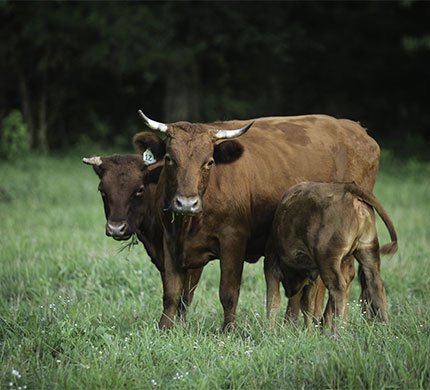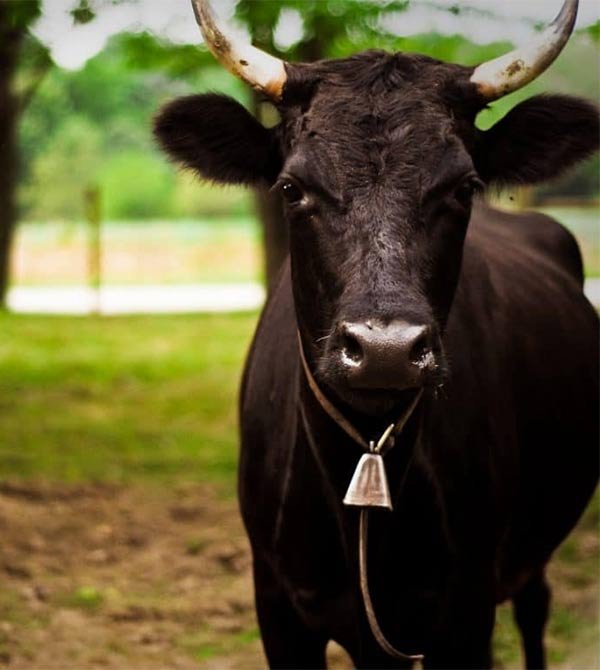Dexter
- Temperature:Cold, wet and windy conditions
- Milk:4-5%
- Food:Grazers and grass-based diets
- Pregnancy:283 days
- Nationality:Ireland, US, Canada and Australia

General Information
Dexter cattle are a small breed of cattle that originated in Ireland. They are known for their hardiness and adaptability to a variety of climates, making them a popular choice for small farms and homesteads. Dexter cattle are usually black, red, or dun in color, and have a friendly and docile temperament. They are dual-purpose cattle, meaning they can be used for both meat and milk production. While their milk production is not as high as some larger breeds, the quality of their milk is prized for its rich and flavorful taste.
Dexter cattle are also known for their efficient grazing and can be raised on grass-based diets. They are easy calvers and typically have few problems during pregnancy and birth. Due to their small size, Dexter cattle require less feed and space than larger breeds, making them a good choice for small-scale farmers or those with limited resources.
Overall, Dexter cattle are a versatile and hardy breed that can be a great addition to any small farm or homestead.
Where we find this cow to buy?
Dexter cattle can be found for sale from a variety of sources, including breeders, livestock auctions, and online marketplaces.
One way to find Dexter cattle for sale is to search online for Dexter cattle breeders in your area or in a nearby region. You can also check local livestock auctions or classified ads in farming or livestock publications.
When buying Dexter cattle, it is important to do your research and choose a reputable breeder or seller who can provide you with information about the cow’s health history, lineage, and temperament.
It is also a good idea to inspect the cow in person before making a purchase to ensure that it is healthy and free from any major health issues.

How to increase milk production in Dexter?
While Dexter cattle are not known for their high milk production compared to some other dairy breeds, there are still some things that can be done to help increase their milk production:
01
Providing a well-balanced diet that meets the cow’s nutritional needs is key to ensuring good milk production.
02
Milking the cow regularly and frequently can help to stimulate milk production. It is recommended to milk the cow at least twice a day, at regular intervals.
03
Stress can negatively impact milk production, so it is important to minimize stressors in the cow’s environment.
04
Selecting cows with good milking genetics can also help to improve milk production in the herd over time.
Medicine
There are various types of medicines that may be used to treat health issues in Dexter cattle. These medicines can be prescribed and administered by a veterinarian, who will consider the specific health needs of the animal. Some common types of medicines used in Dexter cattle include:
01
AntibioticsThese medicines are used to treat bacterial infections in cattle, such as pneumonia or mastitis.
02
ParasiticidesThese medicines are used to control or eliminate internal and external parasites, such as worms, ticks, or lice.
03
VaccinesVaccines are used to protect cattle against infectious diseases such as brucellosis, bovine viral diarrhea, or leptospirosis.
04
Anti-inflammatory DrugsThese medicines are used to reduce inflammation and relieve pain in cattle with conditions such as arthritis or lameness.
Pregnancy
Dexter cattle, like most cattle breeds, have a gestation period of approximately 9 months or 280 to 290 days. During pregnancy, a Dexter cow may experience changes in appetite, behavior, and physical appearance. She may also require additional nutrition to support the developing calf.
Dexter cattle typically have single births, although twin births are rare. Calving difficulties are also relatively uncommon in this breed due to their small size and ease of calving. However, it is important to monitor the pregnant cow closely and to seek veterinary assistance if there are any signs of complications.
Once the calf is born, it should receive colostrum, the first milk produced by the cow, within the first few hours of life to receive vital antibodies and nutrients. After that, it is important to provide the calf with a balanced diet of milk and solid foods to support healthy growth and development.
Important!
It is important to ensure that the Dexter’s diet is well-balanced and provides all the necessary nutrients for their overall health and well-being. It is recommended to consult with a veterinarian or a nutritionist to determine the appropriate diet for your Dexter cattle.
Food
Dexter cattle are able to survive on a simple diet of good quality forage, such as grass, hay or silage, and water. However, if you are looking to provide additional nutrition to promote weight gain or milk production, you can supplement their diet with a variety of foods. Here are some common types of food that can be included in a Dexter’s diet:
Dexter cattle are efficient grazers and do well on a diet of grass or hay. You can provide them with fresh pasture or dried hay.
Silage is fermented grass or other plant material that is preserved in airtight conditions. Silage can provide good nutrition for Dexters and can be made from a variety of crops such as corn, alfalfa, or grass.
If you want to promote weight gain in your Dexter cattle, you can supplement their diet with grains such as corn, oats, and barley.
To promote milk production in lactating cows, you can supplement their diet with high-protein feeds such as soybean meal, cottonseed meal, or alfalfa hay.
Facts
Here are some facts about Dexter cattle:
Dexter cattle are a small breed, with cows typically weighing between 600 and 800 pounds and standing only 36 to 44 inches tall at the shoulder.
Dexters are a dual-purpose breed, meaning they are raised for both meat and milk production.
Dexters originated in Ireland, where they were used for milk, meat, and draft power. They were first imported to the United States in 1905.
Dexters are known for their hardiness and adaptability to a variety of climates and conditions. They are also resistant to many common cattle diseases.
Dexters are known for their gentle disposition and friendly personality, which makes them a popular choice for small-scale farming and homesteading.
They are listed as a threatened breed by the Livestock Conservancy, a non-profit organization dedicated to preserving rare and endangered livestock breeds.